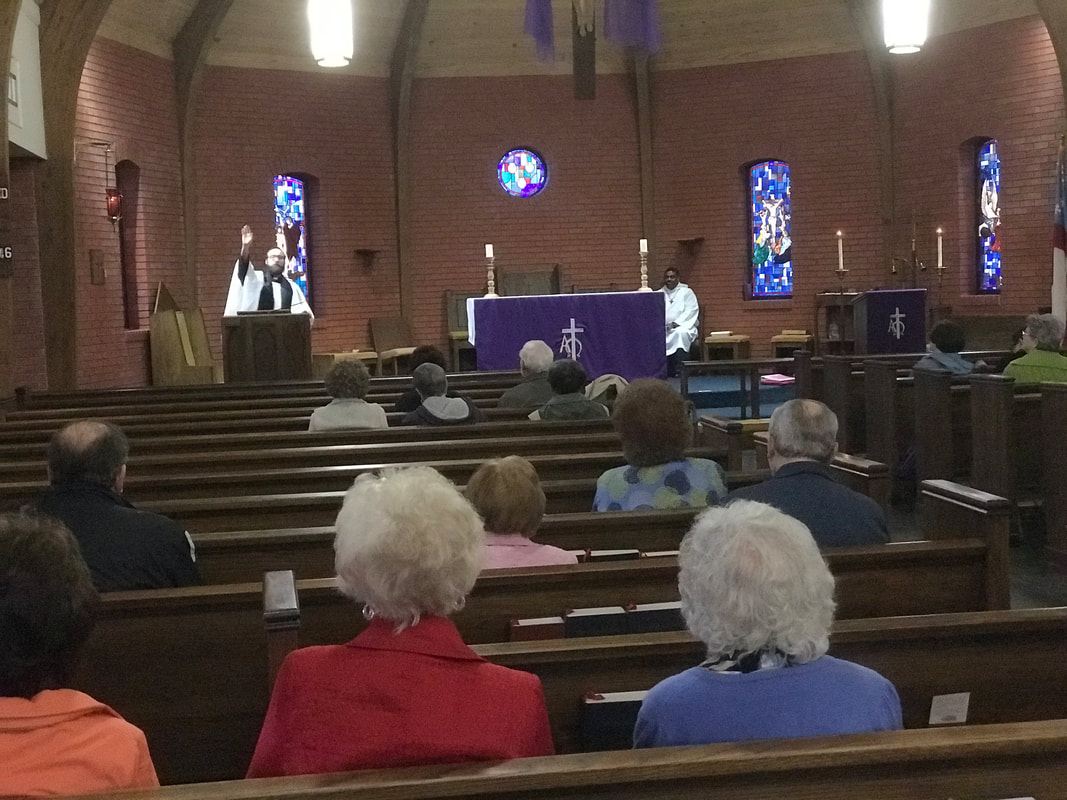Holy Eucharist
Our primary form of worship on Sunday mornings is the Holy Eucharist found in The Book of Common Prayer otherwise known as the "mass," "holy communion," or "the Lord's supper." The word "eucharist" comes from the Greek for "thanksgiving" because in our worship of God we are making an offering of thanks and praise, of our whole selves, and of the fruits of the Earth found in the elements of bread and wine. Through our prayers, our singing, and our gathering together we experience the presence of Jesus Christ in our midst and more specifically take in his body and blood in our sharing of the bread and the wine.
All baptized Christians are welcome to receive the body and blood of our Lord Jesus Christ at our altar. If you are unable to receive communion in our tradition, you are still invited to come forward to receive a blessing from the priest; this can be indicated by the crossing of one's arms across their chest.
Our primary form of worship on Sunday mornings is the Holy Eucharist found in The Book of Common Prayer otherwise known as the "mass," "holy communion," or "the Lord's supper." The word "eucharist" comes from the Greek for "thanksgiving" because in our worship of God we are making an offering of thanks and praise, of our whole selves, and of the fruits of the Earth found in the elements of bread and wine. Through our prayers, our singing, and our gathering together we experience the presence of Jesus Christ in our midst and more specifically take in his body and blood in our sharing of the bread and the wine.
All baptized Christians are welcome to receive the body and blood of our Lord Jesus Christ at our altar. If you are unable to receive communion in our tradition, you are still invited to come forward to receive a blessing from the priest; this can be indicated by the crossing of one's arms across their chest.
|
Rite I or Rite II
The Book of Common Prayer contains two forms of worship for the Eucharist. Rite I is based on the rituals used in the Church of England at the time of the Reformation and the language used reflects that historic character. Rite II is based on the rituals of the early Church and uses contemporary language. A Service of Public Healing
This service is a Holy Eucharist with a special intention towards those seeking God's healing presence in their lives. There are prayers for the healing of the world and for the health of individuals and an opportunity for those present to be anointed with holy oil and prayed over by the priest. |
Morning Prayer
Morning Prayer is the first service of the Daily Office. The Daily Office also includes Noonday Prayer, Evening Prayer, and Compline. The origin of the Daily Office begins in the round of daily prayers of Judaism and developed into the Liturgy of the Hours in Christian Monasteries. These elaborate services were simplified at the time of the English Reformation to make them available to all Christians to pray within their daily lives.
Morning Prayer includes time for prayers of intercession and of thanksgiving, readings from the Bible including the recitation of Psalms, and opportunities to offer praise to God for the gift of a new day.
Morning Prayer is the first service of the Daily Office. The Daily Office also includes Noonday Prayer, Evening Prayer, and Compline. The origin of the Daily Office begins in the round of daily prayers of Judaism and developed into the Liturgy of the Hours in Christian Monasteries. These elaborate services were simplified at the time of the English Reformation to make them available to all Christians to pray within their daily lives.
Morning Prayer includes time for prayers of intercession and of thanksgiving, readings from the Bible including the recitation of Psalms, and opportunities to offer praise to God for the gift of a new day.

